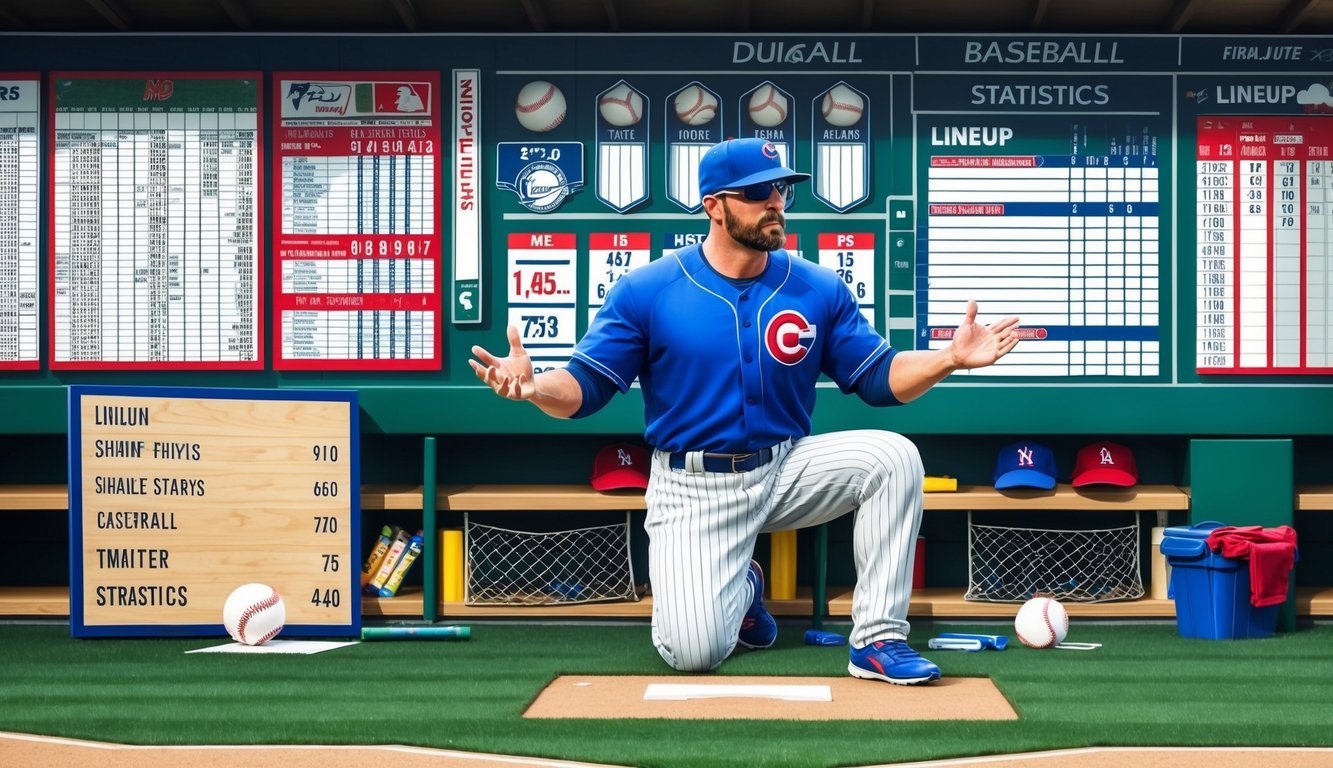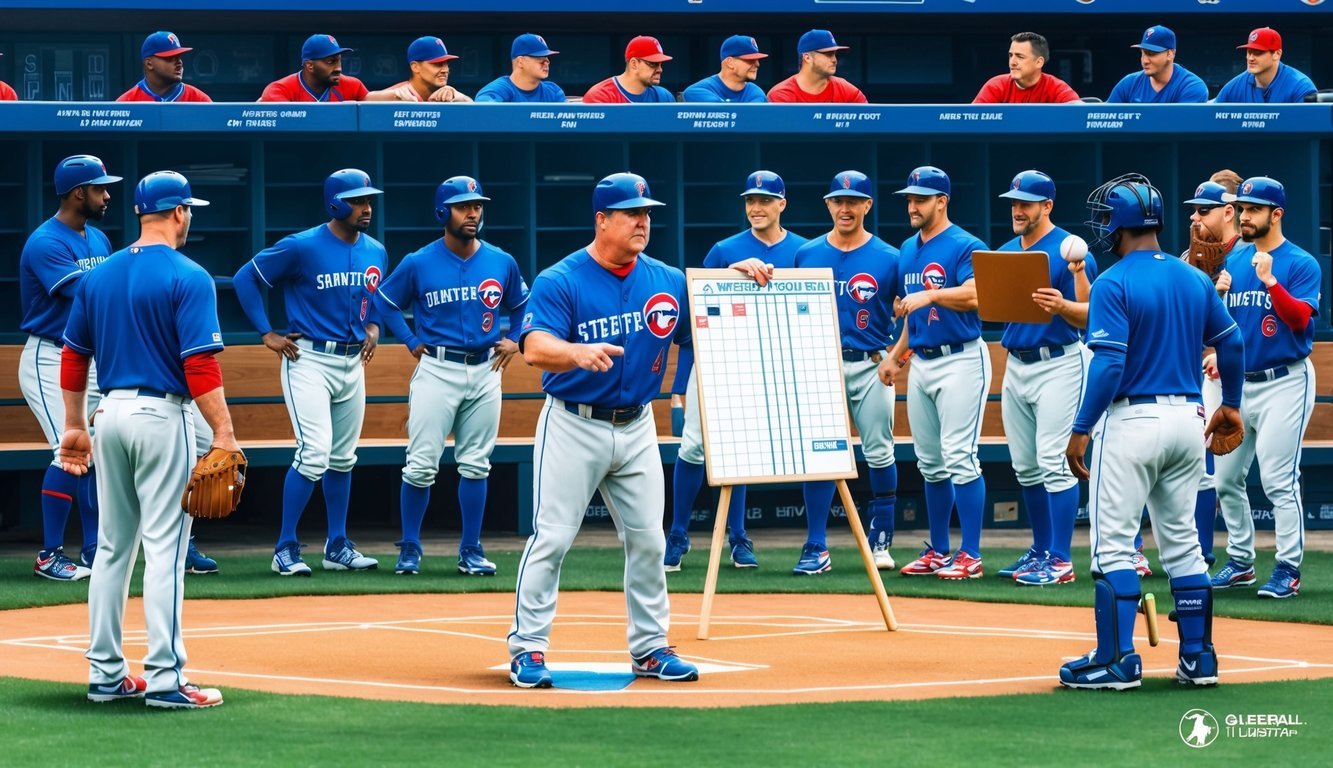Baseball managers are the masterminds behind every successful team.

They make crucial decisions that can turn the tide of a game or even an entire season.
From lineup choices to pitching rotations, their strategic moves shape the outcome on the field.
Fantasy baseball enthusiasts can step into a manager’s shoes through games like Baseball Manager. These simulations offer a taste of the real-world challenges faced by MLB skippers.
Players draft their dream teams, manage rosters, and compete against others in realistic leagues.
The role of a baseball manager extends far beyond the dugout.
They serve as leaders, motivators, and mentors to their players.
Great managers like Joe Torre, Tony La Russa, and Bruce Bochy have left lasting impacts on the sport, guiding their teams to multiple World Series titles and earning their place in baseball history.
The Role of a Baseball Manager

Baseball managers are the strategic masterminds behind a team’s performance.
They make crucial decisions that shape the game’s outcome and foster a winning culture within the clubhouse.
In-Game Strategy
Managers constantly analyze the game situation to make tactical choices.
They decide when to steal bases, call for bunts, or use pinch hitters.
These decisions can turn the tide of a game.
Lineup creation is a key responsibility.
Managers consider player stats, matchups, and current form when crafting the batting order.
They also make pitching changes and defensive substitutions as needed.
During crucial moments, a manager might visit the mound to calm a pitcher or discuss strategy.
Their ability to read the game and react quickly is vital for success.

Team Leadership and Culture
Off the field, managers set the tone for team culture.
They establish clubhouse rules and expectations, fostering discipline and unity among players.
Managers work closely with coaches to develop training programs and practice routines.
They identify areas for improvement and help players hone their skills.
Media relations are an important aspect of the role.
Managers represent the team in press conferences, handling tough questions and protecting their players from undue criticism.
Building relationships with players is crucial.
Effective managers motivate their team, manage personalities, and create an environment where players can thrive.
Behind the Scenes
Baseball managers juggle numerous responsibilities out of the public eye.
Their role extends far beyond what fans see during games, involving complex team dynamics and organizational coordination.
Managing the Clubhouse
Managers set the tone for team culture and morale.
They establish clubhouse rules and policies to maintain discipline and foster a positive environment.
This includes addressing conflicts between players, managing egos, and boosting team spirit.
Managers also work closely with the training staff to monitor player health and fitness.
They make decisions on rest days and playing time based on physical condition reports.
Communication is key – managers hold regular meetings with players to discuss performance, goals, and any concerns.
In the clubhouse, managers often play the role of mentor and motivator.
They offer advice, share experiences, and provide emotional support to help players navigate the pressures of professional baseball.
Coordinating with Coaches and General Manager
Managers collaborate closely with their coaching staff to develop game strategies and player development plans.
They delegate responsibilities to hitting, pitching, and base coaches while maintaining a unified team approach.
Regular meetings with the general manager involve discussions on roster moves, player acquisitions, and long-term organizational goals.
Managers provide valuable input on player performance and team needs, influencing front office decisions.
They also work with the bullpen coach to manage pitcher workloads and develop relief strategies.
This includes creating throwing schedules and determining optimal usage patterns for relievers.
Effective communication between managers, coaches, and the front office is crucial for aligning on-field performance with organizational vision.
Managers act as a bridge, translating front office directives into practical team strategies.
History and Notable Figures

Baseball management has evolved significantly since the sport’s early days.
Key figures have shaped strategies, team cultures, and the overall approach to leading professional baseball clubs.
In recent years, the integration of data analytics and advanced scouting techniques has transformed decision-making processes, enabling teams to make more informed choices both on and off the field.
Moreover, the role of managers has expanded beyond mere in-game decisions, as they now also focus on fostering player development and maintaining a positive clubhouse environment.
This evolution raises intriguing questions about tactical maneuvers, such as ‘which dugout for home team‘ the players and coaching staff will utilize when strategizing for a game.
Pioneers of Managing
Connie Mack stands out as one of baseball’s most influential early managers.
He led the Philadelphia Athletics for an astounding 50 years, winning nine pennants and five World Series titles.
Mack’s innovative tactics and player development skills set a high standard for future managers.
John McGraw of the New York Giants was another pioneer.
His aggressive style of play, known as “inside baseball,” revolutionized the game in the early 1900s.
McGraw won 10 pennants and three World Series championships during his 30-year tenure.
Casey Stengel later made his mark with the New York Yankees.
He guided the team to 10 pennants and 7 World Series victories in 12 years, showcasing his unique ability to manage personalities and maximize talent.
Modern Influencers in Management
Joe Maddon emerged as a forward-thinking manager in the 21st century.
He led the Tampa Bay Rays to their first World Series appearance in 2008 and later broke the Chicago Cubs’ 108-year championship drought in 2016.
Maddon’s unconventional methods and focus on player psychology have inspired many current managers.
Terry Francona’s success with the Boston Red Sox, ending their 86-year World Series drought, cemented his place among modern greats.
His calm demeanor and ability to handle high-pressure situations have been widely admired.
A.J. Hinch represents the new wave of data-driven managers.
His blend of analytics and traditional baseball knowledge helped the Houston Astros win the 2017 World Series, though the title was later tarnished by a sign-stealing scandal.
Strategic Decisions and Game Management

Baseball managers play a crucial role in shaping their team’s performance through strategic decision-making.
They must balance multiple factors to optimize lineup composition and pitching management during games.
Lineup Construction and Batting Order
Managers carefully craft daily lineups to maximize offensive production.
They consider player matchups against opposing pitchers, recent performance trends, and individual strengths.
Left-handed hitters often face right-handed pitchers, while hot bats move up in the order.
The leadoff spot typically goes to a player with high on-base percentage.
Power hitters occupy the heart of the order – usually 3rd, 4th, and 5th.
Managers may alternate lefties and righties to make it harder for relief pitchers later in the game.
Lineup decisions also factor in defensive needs and player rest schedules.
A manager might rest a regular starter to keep them fresh for an important upcoming series.
Pitching Changes and Bullpen Management
Effective pitching management can make or break a game.
Managers closely monitor their starting pitcher’s performance, pitch count, and fatigue level.
They look for signs of struggle like decreased velocity or poor command.
When to pull the starter is a critical decision.
Managers weigh the pitcher’s effectiveness against the strength of available relievers.
They consider matchups with upcoming batters and the game situation.
Bullpen management requires balancing short-term needs with long-term pitcher health.
Managers try to avoid overusing relievers.
They consider each pitcher’s recent workload and recovery time.
Specialized relievers may be brought in for specific situations.
A lefty specialist might face a tough left-handed batter.
Closers usually handle the 9th inning in close games.
Managerial Career and Development

Becoming a baseball manager requires a blend of experience, knowledge, and leadership skills.
The path to this role often involves years of dedication to the sport and a deep understanding of its intricacies.
Paths to Becoming a Manager
Many baseball managers start their careers as players.
Some transition directly from playing to managing, while others gain experience in coaching or front office roles first.
MLB teams often look for candidates with a strong baseball background.
Minor league management is a common stepping stone.
This allows aspiring managers to hone their skills and prove their ability to lead a team.
Some managers begin at the high school or university level before moving up.
Former players without managerial experience may serve as coaches in MLB organizations.
This helps them learn the ropes and build relationships within the league.
Skills and Qualities of Successful Managers
Effective baseball managers possess a unique set of qualities.
Motivating players and maintaining team morale requires strong leadership skills.
Strategic thinking is essential.
Managers must make quick decisions during games and develop long-term plans for their teams.
They also need a deep understanding of baseball tactics and player development.
Communication skills are vital.
Managers interact with players, coaches, front office staff, and the media.
Clear, concise communication helps build trust and unity within the organization.
Adaptability is key in today’s MLB.
Modern managers work closely with analytics departments, balancing data-driven insights with traditional baseball wisdom.
- Emotional intelligence
- Player development expertise
- Game management skills
- Media savvy
Successful managers often display patience, resilience, and a passion for the game.
These qualities help them navigate the ups and downs of a long season and foster a winning culture.
